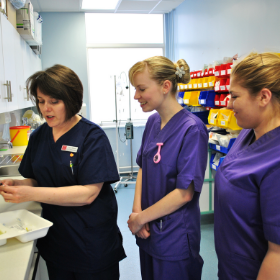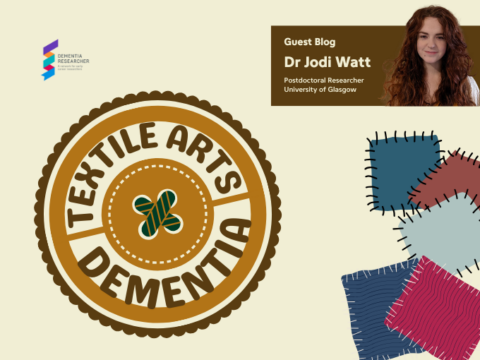Hello everyone and happy careers festival week! For those of you who have not read my blogs before, my name is Emily Oliver and I am the Lead Nurse for dementia at Portsmouth Hospital University Trust. I am a regular blogger here so you may have seen my previous posts which can be found here (https://www.dementiaresearcher.nihr.ac.uk/author/emilyoliverdem/) but for those of you who haven’t read them, a brief introduction to me is that I am a mental health nurse by background and I undertook a clinical academic doctorate that focused on compassionate care for people with dementia in hospitals in 2014. Since then, I have worked in a range of settings and have done my best to remain within both clinical and academic work, predominately working clinically but also dipping my toes into research where possible. As part of the careers festival week, I am here to talk about how I went from nursing to academic work and the benefits of doing so.
When I first started my nursing career in 2011, I would never have thought that the path I was about to take would lead me to be involved in dementia research. I had started nursing because I wanted to be a nurse at the “frontline” of care, providing direct support to patients. I completed my 6 placements which I absolutely loved and like many other nursing graduates, started to apply for clinical Band 5 roles.
Towards the end of my third year of my nursing course, we were tasked with designing an audit as part of our final dissertation. For this I decided to design an audit that focused on the use of antipsychotics for people with dementia in hospital – many of my peers found this a tedious task, doing literature searches, learning about different methodologies and analysing data wasn’t what people had signed up for within a nursing degree, but for me I found it fascinating. The fact that I was able to learn so much from other studies during the literature scope, play a key part in creating new information and then actually use it to influence changes within practice was really exciting and I realised, was something that I wanted to continue to do once qualifying. I started to explore what roles within nursing would allow me to do this regularly, whilst also allowing me to practice clinically as a nurse.
Following a conversation with my supervisor, I was made aware of the clinical academic pathway created by Health Education England and found the idea of a clinical academic doctoral research project. I was lucky in that the University I was studying at provided this type of pathway, however, I know that many organisations offer similar pathways so could have moved around if I had wanted. Following an open evening, a research proposal and an interview later, I was starting my journey as a clinical academic doctoral researcher, researching compassionate care for people with dementia, whilst working on an older persons medicine ward within an acute hospital.
Different fellowships have different projects and therefore some have very specific focuses whereas others are much more broad. I was lucky in that my project focus was quite broad and therefore I was able to use my clinical expertise and literature search to guide what was the focus for my research. For me, this is the most exciting part of being a clinical academic, you can really understand what the concerns and issues are within practice and use this knowledge to guide your research topic which really makes you feel like you are making a difference.
I am sure you won’t want to read realms about what I did during my 4 years as a clinical academic researcher but all I will say that if you get the opportunity to do one, then be sure to take it. Despite the often long hours and the enormity of doing a PhD, I absolutely loved every minute of my doctorate as it was 4 years of learning everyday which isn’t something that happens often. I was leading on my own research project, attending training courses, speaking at national/international conferences, writing papers and meeting a whole host of researchers with a similar interest across the country. The number of opportunities I was offered during those 4 years was unlike no other, I worked with professors on their research projects, collaborated on journal articles with other researchers and networked with people I could have only dreamed of meeting. Was it sometimes hard? Ofcourse. And did I ever feel stressed? Weekly! But would I do it all again? Absolutely! If someone offered me the chance to do it all again, I’d take it in a heartbeat.
Following the completion of my PhD, I started to think about applying for jobs. I have written a blog about the what next after a doctorate but the take home message is that the world is your oyster. The skills and experience you gain from working both clinically and academically cannot be underestimated and it allows you to broaden your horizons in terms of the jobs you apply for. When scoping my next move, I thought about becoming a research fellow, lecturing, practice education and specialist nursing – all of which were made possible through my doctorate. It just so happened that I was contacted by a recruiter and as such started my role within Dementia UK as a practice development facilitator, which I can hand on heart say wouldn’t have been possible if I hadn’t taken the leap into research.
It has not just been the job prospects which have been influenced by my involvement in research but actually my mind-set and the way I approach my work has also changed. Through undertaking a PhD, I have learnt skills such as literature scoping, critical thinking, project management, data analysis and public speaking, all of which I have continued to use and have been of benefit throughout my career.
The benefits of working both clinically and academically for both myself as a professional and for the service users I work with, cannot be underestimated. The skills and experience I gained from being involved in research has been such a benefit for me in all of my roles since and I truly believe that if I hadn’t had done the clinical academic pathway then I wouldn’t be in the role I am today. I couldn’t recommend being part of both camps enough and would encourage anyone to become involved in research wherever possible.
Feel free to follow me on twitter and drop me a message if you would like to find out more: @emilyoliverdem and please do keep an eye out for my upcoming blogs in which I will share more of my clinical academic career.
Join our webinar on Friday 5th March 2021 (or the recording on our YouTube Channel if reading this after the 5th) to hear from the NIHR Academy, Dr Emily Oliver and others who have turned to dementia research from the clinical work.
Author
Dr Emily Oliver is a registered mental health nurse who has specialised in Dementia since qualifying. Emily undertook a clinical academic research fellowship funded by NIHR that focused on how work system factors influence nurse’s capacity to provide relationship centered care. Emily currently works as a Lead Nurse for Dementia at Portsmouth Hospital University Trust and her previous role was as a Consultant Admiral Nurse for Dementia UK. Emily’s research interest focuses on compassionate care for people with dementia and their carers, particularly in acute hospital settings and she has recently been awarded a Florence Nightingale Travel Scholarship to explore this in Denmark.
Got a question for Emily? Post a reply in the blow below

 Print This Post
Print This Post






